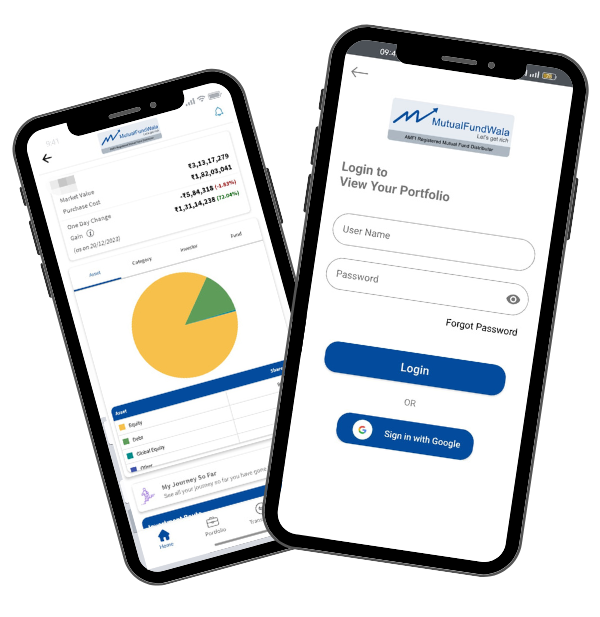Investing in Indian mutual funds is appealing for Non-Resident Indians (NRIs) and Overseas Citizens of India (OCI) cardholders.
It helps them stay connected to their roots and allows them to participate in India’s growth story.
While NRIs and OCI cardholders often share similar financial goals, the rules and processes for investing in Indian mutual funds are distinct for each group.
If you’re wondering, “Can NRIs invest in Indian mutual funds?” or “Can OCI holders invest in mutual funds in India?” This guide will help clarify the differences and requirements.
Who Are NRIs and OCI Cardholders?
NRIs (Non-Resident Indians): NRIs are Indian citizens who live outside India for work, studies, or other purposes. Their classification is primarily determined by their duration of stay outside India. Here is a complete breakdown:-
An individual is classified as a resident if they satisfy any one of the below terms:
- Stayed in India for 182 days or more during the financial year, or
- Stayed in India for 60 days or more during the financial year and for a total of 365 days or more in the preceding four financial years.
If neither of these conditions is met, the individual is classified as a Non-Resident Indian (NRI) for tax purposes.
OCI Cardholders (Overseas Citizens of India): OCI cardholders are foreign citizens of Indian origin who hold a special status under Indian law. With an OCI card, they enjoy several rights, including the ability to live and work in India indefinitely. While similar to NRIs in many aspects, OCI cardholders have more flexibility in investments due to fewer regulatory restrictions.
Repatriation of Funds
Repatriation refers to transferring funds earned in India back to your resident country. The rules for repatriation vary for NRIs and OCI cardholders.
NRIs:
- NRIs can repatriate their principal investment and any profits earned from mutual funds through their NRE (Non-Resident External) accounts.
- If investments are routed through an NRO (Non-Resident Ordinary) account, repatriation of earnings is subject to limits and requires additional documentation.
- Tax on mutual fund earnings is deducted at source before funds can be transferred out of India.
OCI Cardholders:
- OCI cardholders can repatriate their initial investment amount. However, there may be some restrictions on repatriating capital gains (profits earned on investments).
- They should verify the exact conditions for repatriation based on their banking arrangements and the type of investments made.
How Can NRIs and OCI Cardholders Invest in Indian Mutual Funds?
Both NRIs and OCI cardholders must complete specific steps before investing in Indian mutual funds.
NRIs:
- KYC Process: Complete the Know Your Customer (KYC) process by submitting documents like your passport, visa, and proof of overseas address.
- Banking Arrangements: Open an NRE or NRO account to route investments.
- NRE accounts are used for fully repatriable investments.
- NRO accounts handle income earned in India, like rent or dividends, and have repatriation limits.
- Choose Mutual Funds: Consider tax implications and repatriation rules when selecting mutual funds that align with your financial goals.
OCI Cardholders:
- KYC Process: Submit documents such as your OCI card, proof of Indian origin, and overseas address.
- Banking Arrangements: OCI cardholders can use their NRE or NRO accounts. Additionally, if they have resident Indian accounts, they can also use those for investments.
- Investment Options: Like NRIs, OCI cardholders can invest in mutual funds but have slightly more flexibility in managing funds due to fewer regulatory restrictions.
Tax Implications for NRIs and OCI Cardholders
Taxes are a crucial consideration for both NRIs and OCI cardholders. The rules depend on factors like the type of investment and whether India has a tax treaty with your resident country.
NRIs:
- Mutual fund earnings for NRIs are taxed at source. The tax rates on long-term capital gains (LTCG) and short-term capital gains (STCG) depend on the type of fund (equity or debt).
- India has Double Taxation Avoidance Agreements (DTAAs) with many countries, preventing NRIs from paying twice taxes on the same income.
OCI Cardholders:
- OCI cardholders follow the same tax rules as NRIs. However, they must also check if their resident country has a DTAA with India. This treaty can significantly reduce tax liability.
Real Estate Investment Options
Mutual funds are not the only option; many NRIs and OCI cardholders also invest in Indian real estate.
NRIs:
- NRIs can buy residential and commercial properties. However, they cannot invest in agricultural land, plantations, or farmhouses.
- Investments must be made through NRE or NRO accounts.
OCI Cardholders:
- OCI cardholders have the same real estate investment rights as NRIs. They can buy most properties in India, subject to the same restrictions.
Banking Needs for Investments
A proper banking arrangement is essential for managing investments in India.
NRIs:
- NRE Account: Used for income earned outside India. Fully repatriable and tax-free.
- NRO Account: Used for income earned within India, such as rent or dividends. Repatriation is allowed up to $1 million per year with proper documentation.
- Foreign Currency Non-Resident Account (FCNR) Account: Holds foreign currency deposits and avoids currency conversion risks.
OCI Cardholders:
- OCI cardholders can open and use NRE and NRO accounts in the same way as NRIs. Depending on their status, they may also use resident Indian accounts for their investments.
Legal Considerations for Inheritance and Succession
When planning your investments, consider how Indian laws on inheritance and succession might affect your assets.
NRIs:
- NRIs must comply with Indian succession laws for investments and properties in India. These laws determine how assets are distributed among heirs.
OCI Cardholders:
- OCI cardholders follow the same inheritance and succession rules as resident Indians. They typically have more control over the distribution of their assets due to their legal status.
निष्कर्ष
So, can NRIs and OCI cardholders invest in Indian mutual funds? Absolutely! But the rules and processes differ.
- NRIs must carefully navigate repatriation rules, tax implications, and the choice of banking accounts.
- OCI cardholders benefit from broader investment options and greater flexibility but must stay aware of tax treaties and regulatory updates.
Both groups can successfully invest in Indian mutual funds by staying informed and working within the framework of Indian regulations. Whether you’re an NRI or an OCI cardholder, investing in Indian mutual funds is a great way to grow your wealth while staying connected to India’s economic progress.
Take small steps, understand the rules, and let your investments flourish.











